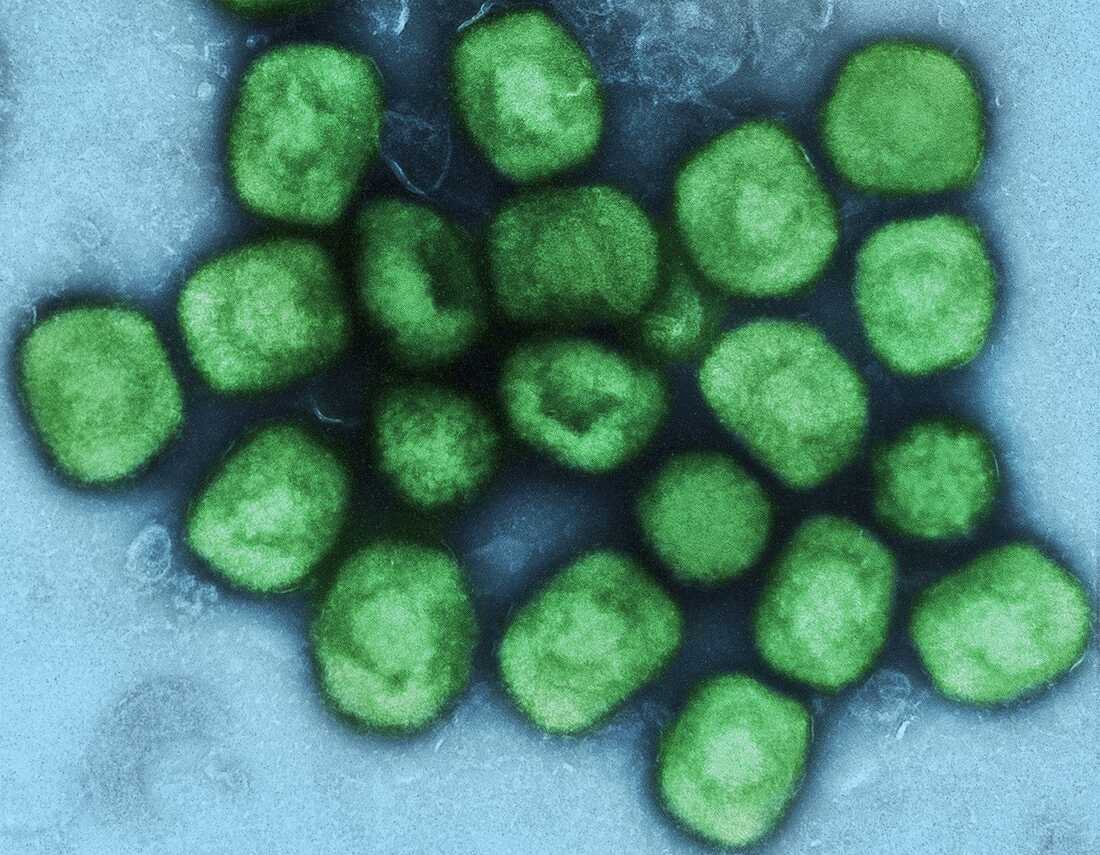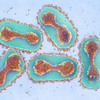[ad_1]

This picture reveals purified particles of mpox virus, previously referred to as monkeypox. Viruses like these might be genetically altered within the lab in ways in which may make them extra harmful.
NIAID
conceal caption
toggle caption
NIAID

This picture reveals purified particles of mpox virus, previously referred to as monkeypox. Viruses like these might be genetically altered within the lab in ways in which may make them extra harmful.
NIAID
Over 150 virologists have signed on to a commentary that claims all of the proof up to now signifies that the coronavirus pandemic began naturally, and it wasn’t the results of some type of lab accident or malicious assault.
They fear that continued hypothesis a few lab in China is fueling requires extra regulation of experiments with pathogens, and that this can stifle the essential analysis wanted to organize for future pandemics.
The virologists issued their assertion a day earlier than advisors to the federal authorities accomplished a evaluation of the present oversight system for experiments which may make current pathogens even worse.
At a gathering Friday, these advisors voted to endorse, with minor modifications, a set of suggestions that name for increasing a particular decision-making course of. This course of at the moment weighs the dangers and advantages of experiments which may change “potential pandemic pathogens” in ways in which might make them extra harmful.
Their recommendation will now get thought-about by officers at a number of companies and teams throughout the federal government who will wish to weigh in, together with the White Home Workplace of Science and Expertise Coverage and the Nationwide Safety Council.
“This will likely be a deliberative course of,” says Lawrence Tabak, who’s performing the duties of the director of the Nationwide Institutes of Well being (NIH).
He says it is not clear but what number of NIH-funded analysis tasks is likely to be affected. “We now have not but formally begun to do this evaluation,” Tabak says. “We simply acquired these suggestions at present.”
It is that type of uncertainty that makes infectious illness specialists nervous. However some see the proposed adjustments as an actual step ahead.
“The federal government actually has a powerful curiosity on behalf of all of us, within the public, in realizing when researchers wish to make a virus extra deadly or extra transmissible, and understanding how that might be carried out and why that might be carried out, and whether or not the advantages are price it,” says Tom Inglesby, director of the Middle for Well being Safety on the Johns Hopkins Bloomberg College of Public Well being.
The origins of the pandemic
All of this comes because the lab in China, generally known as the Wuhan Institute of Virology, is once more within the headlines. An inner authorities watchdog launched a report this week criticizing the Nationwide Institutes of Well being, saying it did not adequately monitor grant awards given to a nonprofit that had collaborated with scientists on the Wuhan lab.
Felicia Goodrum, a virologist on the College of Arizona, says that open-minded specialists have investigated the origins of the pandemic. The obtainable proof, she says, helps the notion that the virus emerged from nature identical to different viruses resembling HIV and Ebola did — by leaping from animals into individuals who had contact with them.
“The proof that we have now up to now means that SARS-CoV-2 entered the human inhabitants by that route,” says Goodrum. “There isn’t any proof on the contrary or in help of a lab leak, nothing credible.”
Fundamental analysis on viruses, she says, is what led to the swift improvement of vaccines and medicines to battle the pandemic.
And but virologists have watched in dismay as misinformation and conspiracy theories have positioned the blame on science.
“There’s this entire disconnect between actuality and what occurred,” says Michael Imperiale, a virologist on the College of Michigan.
He says that whereas debates have gone on for years concerning the knowledge of doing experiments which may make unhealthy viruses even worse, this second feels completely different.
“The pandemic,” he says, “has actually type of heightened the urgency with which we have to handle these points, simply due to all of the controversy that is been on the market relating to, you understand, was this a lab leak or not?”
A chicken flu examine raises alarm
In contrast to, say, nuclear physics analysis, biology has historically had a tradition of openness. After the anthrax assaults in 2001, nonetheless, biologists started to grapple with the likelihood that their printed work may function recipes for evildoers who wished to make bioweapons.
And in 2011, there was an outcry after government-funded researchers altered a chicken flu virus that may be lethal in individuals. Their lab work made this virus extra contagious within the lab animals which might be stand-ins for individuals.
Critics stated they’d created an excellent flu. Proponents stated that viruses generally must be manipulated within the lab to see what they is likely to be able to; in nature, in spite of everything, mutations happen on a regular basis and that’s how pandemic strains emerge.
That episode marked the beginning of a protracted, heated debate, plus analysis moratoriums and in the end the event of latest rules. In 2017, a evaluation system was put into place to weigh the dangers and advantages of research which may make a possible pandemic pathogen even worse. To date simply three proposed strains of analysis, with influenza viruses, have been deemed dangerous sufficient to benefit that type of additional scrutiny.
“We’re actually speaking a few small quantity of analysis proposals,” says Lyric Jorgenson, the performing affiliate director for science coverage and the performing director of the Workplace of Science Coverage on the NIH.
She says simply earlier than the pandemic began, officers requested advisors on the Nationwide Science Advisory Board for Biosecurity to think about whether or not the federal government wanted to be extra clear to the general public about the way it was making selections about this type of analysis. Earlier than that work was carried out, the pandemic hit and all the things was placed on maintain. Final yr, officers requested the group to judge the rules extra comprehensively.
If the proposed adjustments developed by this advisory group are finally adopted by the federal government, an additional layer of oversight would apply to any examine “moderately anticipated” to reinforce the transmission or virulence of any pathogen in a method that might make it a public well being menace. Which means extra experiments on extra viruses would get a more in-depth look.
“What this new advice is saying, is that even in case you begin with a virus that had no potential to trigger an epidemic or pandemic, if you’re doing analysis that can change that virus in a method the place it might now trigger an uncontrollable illness, or a broadly spreading illness, that must be reviewed by this new framework,” says Inglesby.
What’s extra, the advisory group has famous that “elevated transparency within the evaluation course of is required to engender public belief within the evaluation and oversight processes.”
What’s ‘Fairly Anticipated’
The American Society for Microbiology responded positively, saying “we urge swift implementation of the really useful adjustments by the federal companies engaged on this work.”
However some virologists assume the satan will likely be within the particulars if these suggestions flip into coverage.
“They hold utilizing this phrase ‘moderately anticipated,'” says Imperiale. “How is that going to be interpreted? Is there going to be clear steering as to what’s meant by that?”
Researchers typically do not know what is going to occur after they begin an experiment, says Goodrum, particularly when the science is cutting-edge.
“That is the place the massive scientific developments come from. And so to tie our fingers behind our again, to say we will solely do the science that we will anticipate, then we’re actually proscribing modern science,” she says.
Ron Fouchier, the virologist at Erasmus College Medical Middle within the Netherlands, whose lab did the chicken flu experiments over a decade in the past, stated in an e mail that he’d hoped the expertise of going by means of a pandemic would simulate extra analysis, not “unnecessarily delay or limit it.”
He stated it seemed like many infectious illness researchers in america “will face substantial delays of their essential analysis efforts, if they will proceed that analysis in any respect.”
The U.S. is uncommon in that it has loads of public dialogue of those points and a system to attempt to handle the dangers, says Inglesby.
He thinks that oversight might be made stronger with out getting in the way in which of science.
“I’m avidly, completely pro-science and pro-research, and specifically pro-infectious illness analysis,” says Inglesby.
However he says there is a very small a part of that analysis “the place there may be the potential for very excessive danger if issues go fallacious, both accidentally or on goal. And so we have now to get the stability proper, between the dangers that might unfold and the potential advantages.”
[ad_2]






